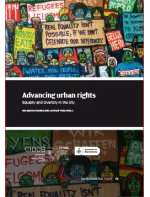The “right to the city” as an ethos of engagement: lessons from civil society experiences in the Global South

Ever since Lefebvre first used the term in 1968, the “right to the city” has been taken on by social movements, NGOs and even some government officials around the world to articulate myriad demands. The term has come about “because it has served to correlate a common set of crosscutting concerns that have emerged from a particular global pattern of capital accumulation and dispossession” (Görgens and van Donk, 2012: 4). The right to the city slogan has increasingly been used by civil society actors in cities of the Global South, where the tendencies of capital accumulation and dispossession have resulted in growing social and spatial inequalities as well as violations of a series of human rights. The concept of the right to the city received particular traction among civil society actors through debates and sessions at the World Social Forums, which culminated in the 2005 World Charter on the Right to the City. This movement has continued and gained new energy through the formation of the Global Platform for the Right to the City in 2014, bringing together a variety of organisations, including networks of local governments from the Global South as well as North.